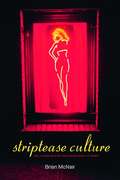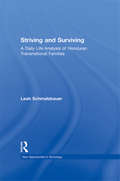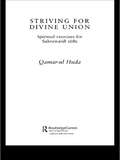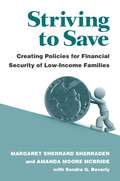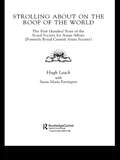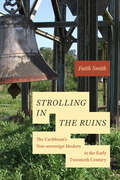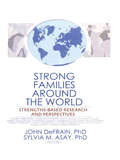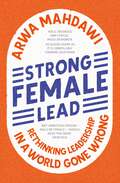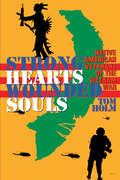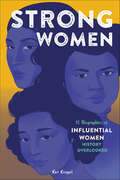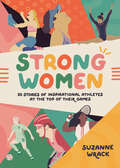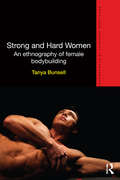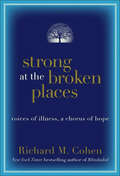- Table View
- List View
Striptease Culture: Sex, Media and the Democratisation of Desire
by Brian McNairFrom advertising to health education campaigns, sex and sexual imagery now permeate every aspect of culture. Striptease Culture explores the 'sexualization' of contemporary life, relating it to wider changes in post-war society. Striptease Culture is divided in to three sections: * Part one – traces the development of pornography, following its movement from elite to mass culture and the contemporary fascination with ‘porno-chic’* Part two – considers popular cultural forms of sexual representation in the media, moving from backlash elements in straight male culture and changing images of women, to the representation of gays in contemporary film and television* Part three – looks at the use of sexuality in contemporary art, examinging the artistic ‘striptease’ of Jeff Koons, and others who have used their own naked bodies in their work.Also considering how feminist and gay artists have employed sexuality in the critique and transformation of patriarchy, the high profile of sexuality as a key contributor to public health education in the era of HIV and AIDS, and the implications of the rise of striptease culture for the future of sexual poltics, Brian McNair has produced an excellent book in the study of gender, sexuality and contemporary culture.
Striving and Surviving: A Daily Life Analysis of Honduran Transnational Families (New Approaches in Sociology)
by Leah SchmalzbauerDrawing on data the author gathered in Honduras and the United States from weekly time diaries, in-depth interviews, participant observation and interpretive focus groups, she looks specifically at the experience and prospects of transmigrant labor in the United States; the aspirations and consumption practices of transnational family members in the United States and Honduras, especially as the relate to the American Dream; and she explores the ways in which families negotiate caretaking responsibilities, both financial and emotional, while striving and surviving in a transnational space. This is the first daily life study of undocumented immigrants and the first transnational analysis of Honduran families.
Striving for Divine Union: Spiritual Exercises for Suhraward Sufis (Routledge Sufi Series)
by Qamar-ul HudaThis book examines the theological, philosophical and Islamic mystical dimensions of the Suhrawardî sufi order from the 13th to 15th centuries. The Suhrawardîs were a legally grounded and intellectually vibrant sufi order whose mystical path was based on exchanges and debates on the Qur'an and on the Prophet's customs. The book analyses their interpretation of sacred texts: the Qur'an, hadiths, sunna, and malfuzat. This created a unique self-understanding, which developed specific sufi spiritual exercises. The book discusses new important ways of thinking about the sufi hermeneutics of the Qur'an and its contribution to Islamic intellectual and spiritual life.
Striving to Save
by Margaret Sherrard Sherraden Amanda Moore Mcbride Sondra G. Beverly"Striving to Savewill inform and inspire social policy with its breakthrough approach in understanding how low-income families make ends meet while striving to make a better life for themselves and their families. Scholarly work in savings, debt, household finance, and behavior economics will benefit from this pioneering study that provides real-life context for some of the most important issues of our day. " ---Tom Shapiro, Brandeis University "The central contribution of the book is to use original qualitative research to provide readers with a nuanced understanding of the financial difficulties facing low-income households, their financial decision-making processes, and their paths to saving and building assets over time. The book provides an essential corrective to the unidimensional view of poor households as unable and unwilling to save. " ---Michael Barr, University of Michigan InStriving to Save, Margaret Sherrard Sherraden and Amanda Moore McBride examine savings in eighty-four working families with low incomes, including fifty-nine families who participated in a groundbreaking program of matched savings and financial education. In-depth interviews with these families, along with savings and survey data, shed light on saving in low-income households. The book concludes with recommended public policy approaches for increasing savings in households that are striving to save. Margaret Sherrard Sherraden is Professor of Social Work at the University of Missouri, St. Louis. Amanda Moore McBride is Assistant Professor of Social Work at Washington University, St. Louis.
Stroke Book: The Diary of a Blindspot
by Jonathan AlexanderAn archive of personal trauma that addresses how a culture still toxic to queer people can reshape a bodyIn the summer of 2019, Jonathan Alexander had a minor stroke, what his doctors called an “eye stroke.” A small bit of cholesterol came loose from a vein in his neck and instead of shooting into his brain and causing damage, it lodged itself in a branch artery of his retina, resulting in a permanent blindspot in his right eye. In Stroke Book, Alexander recounts both the immediate aftermath of his health crisis, which marked deeper health concerns, as well as his experiences as a queer person subject to medical intervention.A pressure that the queer ill contend with is feeling at fault for their condition, of having somehow chosen illness as punishment for their queerness, however subconsciously. Queer people often experience psychic and somatic pressures that not only decrease their overall quality of life but can also lead to shorter lifespans. Emerging out of a medical emergency and a need to think and feel that crisis through the author’s sexuality, changing sense of dis/ability, and experience of time, Stroke Book invites readers on a personal journey of facing a health crisis while trying to understand how one’s sexual identity affects and is affected by that crisis. Pieceing and stitching together his experience in a queered diary form, Alexander’s lyrical prose documents his ongoing, unfolding experience in the aftermath of the stroke. Through the fracturing of his text, which almost mirrors his fractured sight post-stroke, the author grapples with his shifted experience of time, weaving in and out, while he tracks the aftermath of what he comes to call his “incident” and meditates on how a history of homophobic encounters can manifest in embodied forms.The book situates itself within a larger queer tradition of writing—first, about the body, then about the body unbecoming, and then, yet further, about the body ongoing, even in the shadow of death. Stroke Book also documents the complexities of critique and imagination while holding open a space for dreaming, pleasure, intimacy, and the unexpected.
Strolling About on the Roof of the World: The First Hundred Years of the Royal Society for Asian Affairs
by Susan Farrington Hugh LeachThis volume covers the first one hundred years of the Royal Society for Asian Affairs, formerly the Royal Central Asian Society. It traces its fons et origo in the Central Asian Question, within the context of the 'Great Game', and continues its fascinating chronology through the two World Wars to the present day. There are separate chapters on its widely drawn membership, variety of activities and archive collection. Throughout the pages are glimpses and vignettes of some of its extraordinary, even eccentric, members and their astonishing adventures. The wealth of factual and often amusing detail makes it a very lively account, which is also valuable as a work of reference for all interested in Asia. The book is generously illustrated and includes some of the Society's unique archival photographs not previously published.
Strolling Through Istanbul: The Classic Guide To The City
by Sumner-BoydFirst published in 2005. Routledge is an imprint of Taylor & Francis, an informa company.
Strolling in the Ruins: The Caribbean's Non-sovereign Modern in the Early Twentieth Century
by Faith SmithIn Strolling in the Ruins Faith Smith engages with a period in the history of the Anglophone Caribbean often overlooked as nondescript, quiet, and embarrassingly pro-imperial within the larger narrative of Jamaican and Trinidadian nationalism. Between the 1865 Morant Bay Rebellion and World War I, British imperialism was taken for granted among both elites and ordinary people, while nationalist discourses would not begin to shape political imagination in the West Indies for decades. Smith argues that this moment, far from being uneventful, disrupts the inevitability of nationhood in the mid-twentieth century and anticipates the Caribbean’s present-day relationship to global power. Smith assembles and analyzes a diverse set of texts, from Carnival songs, poems, and novels to newspapers, photographs, and gardens, to examine theoretical and literary-historiographic questions concerning time and temporality, empire and diaspora, immigration and indigeneity, gender and the politics of desire, Africa’s place within Caribbeanist discourse, and the idea of the Caribbean itself. Closely examining these cultural expressions of apparent quiescence, Smith locates the quiet violence of colonial rule and the insistence of colonial subjects on making meaningful lives.
Strong Families Around the World: Strengths-Based Research and Perspectives
by Sylvia M. Asay John DeFrainThe strengths of families from culture to culture, when compared to each other, are remarkably similar and give us common ground around the world upon which to unite and develop mutual understanding. Strengths-Based Research and Perspectives: Strong Families Around the World, provides a conceptual framework for global family strengths, discussing the diverse strengths and challenges that families face regardless of location. This book presents 43 expert authors from 18 countries in all seven major areas in the world who explain what it means to be a family in the context of their country and the challenges their country faces in the world today. Focusing on the latest studies of similarities between strong families of different cultures, Strengths-Based Research and Perspectives: Strong Families Around the World presents a wide variety of disciplines, including family studies, family education, family therapy, modern languages, psychology, social work, sociology, cultural anthropology, and nursing. This insightful text centers on the Family Strengths Perspective, a paradigm that not only recognizes that there are problems in families today, but demonstrates clearly how these can be dealt with successfully. This valuable resource provides case study examples, quotations from literature and cultural mythology, tables, figures, and extensive references to give readers an in-depth understanding of the issues from strengths-based perspectives. Topics in Strengths-Based Research and Perspectives: Strong Families Around the World include: an introduction into the Family Strengths Perspective the International Family Strengths Model the propositions of the Family Strengths Perspective how the Family Strengths Perspective fits with other conceptual frameworks families from a global perspective a conceptual framework for understanding global family strengths and challenges Strengths-Based Research and Perspectives: Strong Families Around the World is useful as a text in marriage and family relationships classes, cross-cultural family patterns classes, strengths-based practitioner training classes, and family therapy and family educator training classes. This valuable resource will also be of great interest to family educators, family therapists, psychologists, social workers, nurses, and religious counselors.
Strong Families Around the World: Strengths-Based Research and Perspectives
by Sylvia M. Asay John DeFrainThe strengths of families from culture to culture, when compared to each other, are remarkably similar and give us common ground around the world upon which to unite and develop mutual understanding. Strengths-Based Research and Perspectives: Strong Families Around the World, provides a conceptual framework for global family strengths, discussing the diverse strengths and challenges that families face regardless of location. This book presents 43 expert authors from 18 countries in all seven major areas in the world who explain what it means to be a family in the context of their country and the challenges their country faces in the world today. Focusing on the latest studies of similarities between strong families of different cultures, Strengths-Based Research and Perspectives: Strong Families Around the World presents a wide variety of disciplines, including family studies, family education, family therapy, modern languages, psychology, social work, sociology, cultural anthropology, and nursing. This insightful text centers on the Family Strengths Perspective, a paradigm that not only recognizes that there are problems in families today, but demonstrates clearly how these can be dealt with successfully. This valuable resource provides case study examples, quotations from literature and cultural mythology, tables, figures, and extensive references to give readers an in-depth understanding of the issues from strengths-based perspectives. Topics in Strengths-Based Research and Perspectives: Strong Families Around the World include: an introduction into the Family Strengths Perspective the International Family Strengths Model the propositions of the Family Strengths Perspective how the Family Strengths Perspective fits with other conceptual frameworks families from a global perspective a conceptual framework for understanding global family strengths and challenges Strengths-Based Research and Perspectives: Strong Families Around the World is useful as a text in marriage and family relationships classes, cross-cultural family patterns classes, strengths-based practitioner training classes, and family therapy and family educator training classes. This valuable resource will also be of great interest to family educators, family therapists, psychologists, social workers, nurses, and religious counselors.
Strong Female Character
by Hanna FlintLeading film critic of her generation offers an unflinchingly honest and humorous account of her millennial journey towards self-acceptance through a cinematic lens.Hanna Flint speaks from the heart in Strong Female Character, a personal and incisive reflection on how cinema has been the key to understanding herself and the world we live in. A staunch feminist of mixed-race heritage, Hanna has succeeded in an industry not designed for people like her. Interweaving anecdotes from familial and personal experiences - episodes of messy sex, introspection, and that time actor Vincent D'Onofrio tweeted that Hanna Flint sounded 'like a secret agent' - she offers a critical eye on the screen's representation of women and ethnic minorities, their impact on her life, body image and ambitions, with the humour and eloquence that has made her a leading film critic of her generation. Divided into the sections Origin Story, Coming of Age, Adult Material, Workplace Drama and Strong Female Character, the book ponders how the creative industries could better reflect our multicultural society. Warm, funny and engaging and full of film-infused lessons, Strong Female Character will appeal to readers of all backgrounds and seeks to help us better see ourselves in our own eyes rather than letting others decide who and what we can be.
Strong Female Character: Nero Book Awards Winner
by Fern BradyBRITISH BOOK OF THE YEAR: AUDIOBOOK WINNER 2024NERO BOOK AWARDS WINNER 2023WINNER, NON FICTION BOOK 2023, BOOKS ARE MY BAG AWARDSSHORTLIST, BOOKSHOP.ORG INDIE CHAMPIONSSHORTLIST, AMAZON NON-FICTION BOOK OF THE YEARSHORTLIST, GOODREADS CHOICE BOOK OF THE YEARAudible Books of the Year 2023The Times Books of the Year 2023Apple Best Audiobooks of 2023BOOKSHOP.ORG Book of the Month January 2024THE SUNDAY TIMES BESTSELLER'I tore through this hilarious, smart, sad, revealing book' - Bob Odenkirk'Funny, sharp and has incredible clarity' - Jon Ronson'An absolute riot. I'm literally going to read it again once I've finished, and I'm a miserable bastard...it's a belter' - FRANKIE BOYLE'Strong Female Character is a testament to the importance of self-knowledge.' - Rachael Healy, The GuardianA summary of my book:1. I'm diagnosed with autism 20 years after telling a doctor I had it.2. My terrible Catholic childhood: I hate my parents etc.3. My friendship with an elderly man who runs the corner shop and is definitely not trying to groom me. I get groomed.4. Homelessness.5. Stripping.6. More stripping but with more nervous breakdowns.7. I hate everyone at uni and live with a psycho etc.8. REDACTED as too spicy.9. After everyone tells me I don't look autistic, I try to cure my autism and get addicted to Xanax.10. REDACTED as too embarrassing.'Fern's book, like everything she does, is awesome. Incredibly funny, and so unapologetically frank that I feel genuinely sorry for her lawyers.' - PHIL WANG'Of course it's funny - it's Fern Brady - but this book is also deeply moving and eye-opening'- ADAM KAY'It made me laugh out loud and broke my heart and made me weep...I hope absolutely everyone reads this, and it makes them kinder and more curious about the way we all live' - DAISY BUCHANAN'Glorious. Frank but nuanced, a memoir that doesn't sacrifice voice or self-awareness. And it has brilliant things to say about being autistic and being funny' - ELLE MCNICOLL'A set text for all of us in 2023' - DEBORAH FRANCES-WHITE'Fern is a brilliant, beautiful writer with a unique voice and even more unique story. Astute, honest and very, very funny.' - LOU SANDERS'So funny and brilliant' - HOLLY SMALE'Witty, dry, and gimlet-eyed, Strong Female Character is a necessary corrective. Brady offers a compelling, messy, highly resonant portrait of what masked Autism feels like.' - Devon Price, author of Unmasking Autism
Strong Female Character: The Sunday Times Bestseller
by Fern BradyFern Brady was told she couldn't be autistic because she's had loads of boyfriends and is good at eye contact. This is a story of how being female can get in the way of being autistic and how being autistic gets in the way of being the 'right kind' of woman.(p) 2023 Octopus Publishing Group
Strong Female Lead: Lessons From Women In Power
by Arwa MahdawiA response to the woeful inadequacy of male leadership, and an investigation into the qualities demonstrated by the female leaders showing us how it's done. Including original research and interviews with Madeleine Albright, Mary Robinson, Alicia Garza, and many others.The first two decades of the 21st Century have seen financial collapse, a global pandemic, the devastation of our environment and the disintegration of democracies. But while some at the top are telling us 'it is what is it', there's a new generation of leaders showing the world how to be better. They're building trust, investing wisely and acting decisively. And they've got one thing in common.Women have been taught to 'lean in' and act like men to get ahead. But as the financial, environmental, and social systems crumble, isn't it time we had a different plan? And most importantly, what can women in power teach all of us about leadership? (P) 2021 Hodder & Stoughton Ltd
Strong Female Lead: Lessons from Women in Power
by Arwa MahdawiFrom climate change to massive inequality to the decline of trust, the world is facing a number of interconnected crises. Above all else, however, it's facing a crisis of leadership. We have confused confidence with competence and chosen our leaders based not on their skillset and ability, but on how closely they fit our image of a leader. And, funnily enough, that image is very masculine. It's time to change the narrative around leadership. It's time we stopped pathologizing femininity and recognized that the traits we associate with women - things like empathy and collaboration - are strengths, not weaknesses. It's time we stopped telling women to act like men and started telling men to lead like women. Not for politically correct reasons, but for existential ones.The world has never been in greater need of good leaders. Strong Female Lead shows us what they're made of.ReviewsStrong Female Lead is as razor sharp as it is compelling. Utterly contemporary and relevant, Mahdawi is the best writer to give us a long overdue book that speaks so brilliantly to, and about, all women. - Chimene SuleymanThis is a book I wanted to read before I knew it existed. It explores the vital question - What would the world look like if all positions of power were held by people who prioritised empathy and compassion? People who were not led by ego but by the idea of collaboration and inclusivity? Arwa proves without a shadow of doubt, that our future leaders need to be female or to be men who respect and emulate female leadership. I just hope we can hurry up and get there, for all of our sakes. - Annie MacThis is a bold, rigorous and lyrical work which feels both timely and essential. Mahdawi has made a thoroughly nuanced and utterly compelling argument for the new and better forms of leadership that our world urgently needs. Please read it, engage with it, then pass it on. - Musa OkwongaThe opposite of a dry marketing manual - funny, intelligent and bursting with ideas from women I'd never heard of, who deserve to be praised for their leadership Pandora SykesAny ambitious young person - male or female - should read this book. - Sirin KaleArwa Mahdawi's latest book offers a bracing assessment of our current state of financial, ecological, and biopolitical collapse. Turning her attention to the experiences and strategies of women in leadership, Mahdawi brushes aside stale cliches about "leaning in" and "girl bossing" to uncover new social and political strategies. By turns pragmatic, idealistic, and moving, Strong Female Lead will be devoured by powerful women and those who love them. - Grace Lavery, author of Please Miss.So often the reason we don't hear about more women in history lessons is because their stories have never been told. Arwa Mahdawi is here to change that! Strong Female Lead is a fascinating, wonderful read and the most incredible argument for why a specifically female model of leadership might actually be the more powerful and sustainable one. This book will be a bible for any woman searching for inspiration but more importantly it needs to be read by MEN! It's time young boys started idolising female leaders in the same way girls have idolised powerful men throughout history. I am giving each of my brothers a copy of this book for Christmas! - Scarlett Curtis
Strong Female Lead: Lessons from Women in Power
by Arwa MahdawiFrom climate change to massive inequality to the decline of trust, the world is facing a number of interconnected crises. Above all else, however, it's facing a crisis of leadership. We have confused confidence with competence and chosen our leaders based not on their skillset and ability, but on how closely they fit our image of a leader. And, funnily enough, that image is very masculine. It's time to change the narrative around leadership. It's time we stopped pathologizing femininity and recognized that the traits we associate with women - things like empathy and collaboration - are strengths, not weaknesses. It's time we stopped telling women to act like men and started telling men to lead like women. Not for politically correct reasons, but for existential ones.The world has never been in greater need of good leaders. Strong Female Lead shows us what they're made of.ReviewsStrong Female Lead is as razor sharp as it is compelling. Utterly contemporary and relevant, Mahdawi is the best writer to give us a long overdue book that speaks so brilliantly to, and about, all women. - Chimene SuleymanThis is a book I wanted to read before I knew it existed. It explores the vital question - What would the world look like if all positions of power were held by people who prioritised empathy and compassion? People who were not led by ego but by the idea of collaboration and inclusivity? Arwa proves without a shadow of doubt, that our future leaders need to be female or to be men who respect and emulate female leadership. I just hope we can hurry up and get there, for all of our sakes. - Annie MacThis is a bold, rigorous and lyrical work which feels both timely and essential. Mahdawi has made a thoroughly nuanced and utterly compelling argument for the new and better forms of leadership that our world urgently needs. Please read it, engage with it, then pass it on. - Musa OkwongaThe opposite of a dry marketing manual - funny, intelligent and bursting with ideas from women I'd never heard of, who deserve to be praised for their leadership Pandora SykesAny ambitious young person - male or female - should read this book. - Sirin KaleArwa Mahdawi's latest book offers a bracing assessment of our current state of financial, ecological, and biopolitical collapse. Turning her attention to the experiences and strategies of women in leadership, Mahdawi brushes aside stale cliches about "leaning in" and "girl bossing" to uncover new social and political strategies. By turns pragmatic, idealistic, and moving, Strong Female Lead will be devoured by powerful women and those who love them. - Grace Lavery, author of Please Miss.So often the reason we don't hear about more women in history lessons is because their stories have never been told. Arwa Mahdawi is here to change that! Strong Female Lead is a fascinating, wonderful read and the most incredible argument for why a specifically female model of leadership might actually be the more powerful and sustainable one. This book will be a bible for any woman searching for inspiration but more importantly it needs to be read by MEN! It's time young boys started idolising female leaders in the same way girls have idolised powerful men throughout history. I am giving each of my brothers a copy of this book for Christmas! - Scarlett Curtis
Strong Hearts, Wounded Souls: Native American Veterans of the Vietnam War
by Tom HolmAt least 43,000 Native Americans fought in the Vietnam War, yet both the American public and the United States government have been slow to acknowledge their presence and sacrifices in that conflict. In this first-of-its-kind study, Tom Holm draws on extensive interviews with Native American veterans to tell the story of their experiences in Vietnam and their readjustment to civilian life. Holm describes how Native American motives for going to war, experiences of combat, and readjustment to civilian ways differ from those of other ethnic groups. He explores Native American traditions of warfare and the role of the warrior to explain why many young Indian men chose to fight in Vietnam. He shows how Native Americans drew on tribal customs and religion to sustain them during combat. And he describes the rituals and ceremonies practiced by families and tribes to help heal veterans of the trauma of war and return them to the "white path of peace." This information, largely unknown outside the Native American community, adds important new perspectives to our national memory of the Vietnam war and its aftermath.
Strong Is the New Pretty: A Celebration of Girls Being Themselves
by Kate T. ParkerGirls being fearless. Girls being silly. Girls being wild, stubborn, and proud. Girls whose faces are smeared with dirt and lit up with joy. So simple and yet so powerful, Strong Is the New Pretty celebrates, through more than 175 memorable photographs, the strength and spirit of girls being 100% themselves. Real beauty isn’t about being a certain size, acting a certain way, wearing the right clothes, or having your hair done (or even brushed). Real beauty is about being your authentic self and owning it. Kate T. Parker is a professional photographer who finds the real beauty in girls, capturing it for all the world to see in candid and arresting images. A celebration, a catalog of spirit in words and smiles, an affirmation of the fact that it’s what’s inside you that counts, Strong Is the New Pretty conveys a powerful message for every girl, for every mother and father of a girl, for every coach and mentor and teacher, for everyone in the village that it takes to raise a strong and self-confident person.
Strong Women: 15 Biographies of Influential Women History Overlooked
by Kari KoeppelCelebrate, share, and take to heart the unsung accomplishments of these unflappable strong womenThere are so many more incredible women throughout history than you've been taught. You might know some of the most famous and rebellious, but this is your chance to get to know 15 equally powerful strong women who quietly broke barriers and made a lasting impact.From 10th-century novelist Murasaki Shikibu to 19th-century self-made millionaire Madam C.J. Walker, you'll learn about the early life, struggles, and successes of the innovators, changemakers, and ceiling-breakers who redefined what strong women were allowed to be. Even if they never became household names.Strong Women will show you that:Ordinary is extraordinary—Find hope and inspiration in the stories of women who worked in every field and every part of the world, throughout all of history.Dig deep—These biographies are brief and easy to read but include enough detail to present each woman as a complete personality, without shying away from the tough stuff.Always remember—Uncover why so many of these stories were lost to history, and how you can help keep them alive.Discover the quiet power of 15 strong women who changed the world as you know it.
Strong Women: Inspirational athletes at the top of their game
by Suzanne WrackOverpower. Overtake. Overcome. – Serena WilliamsThroughout history, every woman pulling on spikes, lacing up boots and picking up a racquet has been a rebel – and this explosive book aims to uncover the often hidden histories behind 50 of these incredible pioneers.From the first Black woman to be a professional softball player, Betty Chapman, to the iconic 'Battle of the Sexes' match won by Billie Jean King, and from trans trailblazer Laurel Hubbard to Emma Raducanu's unforgettable US Open win, award-winning sports journalist Suzanne Wrack celebrates sporting giants at the absolute top of their games.
Strong Women: Inspirational athletes at the top of their game
by Suzanne WrackOverpower. Overtake. Overcome. – Serena WilliamsThroughout history, every woman pulling on spikes, lacing up boots and picking up a racquet has been a rebel – and this explosive book aims to uncover the often hidden histories behind 50 of these incredible pioneers.From the first Black woman to be a professional softball player, Betty Chapman, to the iconic 'Battle of the Sexes' match won by Billie Jean King, and from trans trailblazer Laurel Hubbard to Emma Raducanu's unforgettable US Open win, award-winning sports journalist Suzanne Wrack celebrates sporting giants at the absolute top of their games.
Strong and Hard Women: An ethnography of female bodybuilding (Routledge Advances in Ethnography)
by Tanya BunsellFemales with large muscles evoke strong reactions from men and women, often involving disgust, discomfort, anger and threat. The controversial nature of female bodybuilding has caused a significant rupture on feminist ground. Whilst proponents claim that female bodybuilding is a way of empowering and liberating women, others see it as a form of corporeal entrapment. This book investigates the controversy. Do women who pump iron resist physical restrictions of imposed femininity, or are they engaged in an ultimately oppressive quest for ‘perfect bodies’? In an original two year ethnographic study based in the South of England, Tanya Bunsell immersed herself into the world of female bodybuilders. By mapping these extraordinary women’s lives, the research illuminates the pivotal spaces and essential lived experiences that make up the female bodybuilder. Whilst the women appear to be embarking on an ‘empowering’ radical body project for themselves, the consequences of their activity remains culturally ambivalent. This research exposes the ‘Janus-faced’ nature of female bodybuilding, exploring the ways in which the women negotiate, accommodate and resist pressures to engage in more orthodox and feminine activities and appearances. This book will be of interest to academics and students in the fields of gender studies, the sociology of sport, the body and research methodology.
Strong at the Broken Places: Voices of Illness, a Chorus of Hope
by Richard M. CohenThe author of Blindsided “gives a voice to the voiceless—the chronically disabled who, in our health-conscious society, are defined by their disease” (Providence [RI] Journal).New York Times–bestselling author Richard M. Cohen spent three years chronicling the lives of five diverse “citizens of sickness”: Denise, who suffers from ALS; Buzz, whose Christian faith helps him deal with his non-Hodgkin’s lymphoma; Sarah, a determined young woman with Crohn’s disease; Ben, a college student with muscular dystrophy; and Larry, whose bipolar disorder is hidden within. Differing in age and gender, race and economic status, all five are determined to live life on their own terms. In Strong at the Broken Places, Cohen shares these inspirational and revealing stories, which offer lessons for us all—on self-determination, on courage in the face of adversity and public ignorance, on keeping hope alive.We are all strong at the broken places—stronger than we think.“The strength of these profiles derives from Cohen’s focus on chronic illnesses that, as he notes, are not ‘sexy’ and generally ‘do not resolve themselves’ . . . These are stories dense with quotidian details.” —The Washington Post“Extraordinary.” —Larry King“Career journalist Cohen doesn’t flinch from probing for truth about relationships, money, fear, and death . . . One only hopes that, with their group presentation to a class of Harvard medical students, these five taught young medicos as much as they could teach Cohen and, through him, us.” —Booklist
Strong of Heart: Life and Death in the Fire Department of New York
by Thomas Von EssenThe SiteMay 30, 2002"How will we ever get through this?" is the question I asked on the night of September 11."How?"Maybe the answer is here, all around me. Not just in the cleanup, not just in the purpose demonstrated by all who came and labored in these months.The answer is in the enduring spirits of all assembled here. That, for me, is the miracle in all of this: having looked horror in the face, we bear the pain without losing heart.-- Thomas Von Essen
Struck: A Husband's Memoir Of Trauma And Triumph
by Douglas SegalOne of life's biggest clichés becomes a horrific reality when Douglas Segal's wife and young daughter are hit head-on by a Los Angeles city bus. Miraculously, his daughter was unharmed, but his wife faced a series of life-threatening injuries, including the same one that famously left Christopher Reeve paralyzed. Following the accident, Segal began sending regular email updates to their circle of friends and family--a list that continued to grow as others heard of the event and were moved by the many emotional and spiritual issues it raised. Segal's compelling memoir is an intimate and honest chronicle built around these email updates, and is a profound example of how people show up for one another in times of crisis. Alternatingly harrowing, humorous, heartbreaking, and hopeful, this is an uplifting tribute to love, determination, and how the compassion of community holds the power to heal, serving as an inspiring testament to the resilience of the human spirit when faced with pain and adversity.
